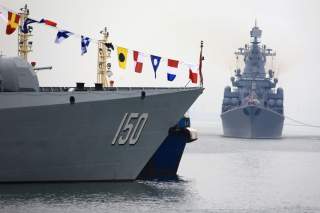China and America: Headed for a Showdown in the South China Sea?
We take a look at what could happen next.
Last year, Beijing restructured the command and control of its coast guard forces by effectively putting them under the direct command of the Central Military Commission. The move aimed to streamline the authority of its coast guard while boosting its ability to safeguard China's maritime interests. But in removing the coast guard from the jurisdiction of the civilian State Oceanic Administration, the restructuring also reduced the diplomatic leeway China previously enjoyed in maritime conflicts with neighboring countries and the United States.
According to an April 28 report, Chief of U.S. Naval Operations Adm. John Richardson warned that the United States would treat China's coast guard and maritime militia the same as it does the country's navy. Richardson allegedly told the Financial Times that he made these remarks to his Chinese counterpart, Shen Jinlong, in January — adding that the U.S. Navy will respond to "provocative acts" by Chinese maritime militias in its continued effort to "conduct routine and lawful operations" around the world.
Why It Matters
If true, Richardson's remarks would reflect a significant evolution in the U.S. response to China's so-called "grey zone" strategy, which involves employing paramilitary forces — including the coast guard and fishing vessels — to enforce Beijing's maritime interests. Over the past decade, China's reliance on its highly advanced maritime paramilitary forces has allowed it to establish advantageous positions in various disputed waters, including the South and East China seas. While this has increased the number of skirmishes on the high seas, the strategy has also helped Beijing avoid inviting direct retaliation from the U.S. Navy. It has also limited the response of regional maritime claimants, such as Japan and Vietnam, to less confrontational encounters.
But by threatening a naval response, the United States is now essentially adopting a perception of China's maritime militia and coast guard as de facto instruments of the state. Such a shift would significantly raise the stakes for China by forcing Beijing to weigh the costs of potential heated conflicts with the U.S. Navy. The prospect also increases the risk of confrontation between the two military powers, especially if China chooses to respond by increasing its naval presence.
In addition, the widened scope of U.S. naval retaliation could free up regional actors, such as Japan, to focus on strengthening their own naval capabilities, instead of splitting their resources and funding between the navy and the coast guard.
Background
Over the years, China's "grey zone" strategy has prompted the United States, as well as several other countries, to continuously recalibrate their response. Claimant states such as Japan, Vietnam and Indonesia have bolstered their own naval capabilities as each vies with Beijing for sea lanes, natural resources and disputed territories. The United States has also increased its coast guard presence in the Indo-Pacific region to counter China's maritime rise — ramping up patrols in the Taiwan Strait last month.
Last year, Beijing restructured the command and control of its coast guard forces by effectively putting them under the direct command of the Central Military Commission. The move aimed to streamline the authority of its coast guard while boosting its ability to safeguard China's maritime interests. But in removing the coast guard from the jurisdiction of the civilian State Oceanic Administration, the restructuring also reduced the diplomatic leeway China previously enjoyed in maritime conflicts with neighboring countries and the United States.
China, U.S.: Washington Raises the Stakes in the South China Sea is republished with the permission of Stratfor Worldview, a geopolitical intelligence and advisory firm.
Image: Reuters

